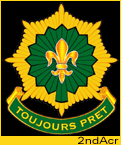Bombur
Posts: 3642
Joined: 7/2/2004
Status: offline

|
quote:
ORIGINAL: Feinder
I would certainly agree with the assertion that, "Pound for Pound, IJN CVs do not equal USN CVs".
USN CVs have radar (BIG help), better AAA, more aircraft, and are generally sturdier, and of course have the added benefit of damage control.
IJN CVs have longer ranged aircraft, and better pilots - helpful true, but the USN having more aircraft somewhat defrays their lack of experience.
However, I think the real question that he is asking is, "Why did the IJN not launch a single strike?" I would say it was bad dice-rolls (spotting and failing the escort roll).
-F-
-I think you forgot to mention the mainly IJN advantage: a somewhat better torpedo bomber (until Jun/42) and a much better torpedo (I don´t know when the USN got a better aerial torpedo). As torpedoes are better to sink ships and WiTP can´t simulate surprise (like happened in Midawy), I believe the Japanses have a small edge over the USN in 1:1 carrier battles, provided both sides can launch a full attack (which almost always happen in WiTP), and as far experience levels for IJN crews remain over 70. That´s what happened historically too (IJN sank 2 CV´s and lost 2 CVL´s, in battles where both sides were able to launch full attacks). On the other hand, it´s possible that, in battles beween super CV´s TF´s, with large numbers of escort ships and fighters for each sides, the IJN will lose due to the fact their bombers are too fragile compared to the SBD (and latter the TBF) and so a larger number of US bombers will be able to survive and attack the enemy (look to the fact that even in Santa Cruz, a battle won by IJN, the losses of bombers were over 50%). Such an encounter never happened historically (Midway being the closest example, but if the same forces that were in Midway, had an engagement far from their respective land bases, with the same levels of recon for each side, the most probable result would have been mutual destruction, or maybe, a small IJN victory)
|
 Printable Version
Printable Version















 New Messages
New Messages No New Messages
No New Messages Hot Topic w/ New Messages
Hot Topic w/ New Messages Hot Topic w/o New Messages
Hot Topic w/o New Messages Locked w/ New Messages
Locked w/ New Messages Locked w/o New Messages
Locked w/o New Messages Post New Thread
Post New Thread